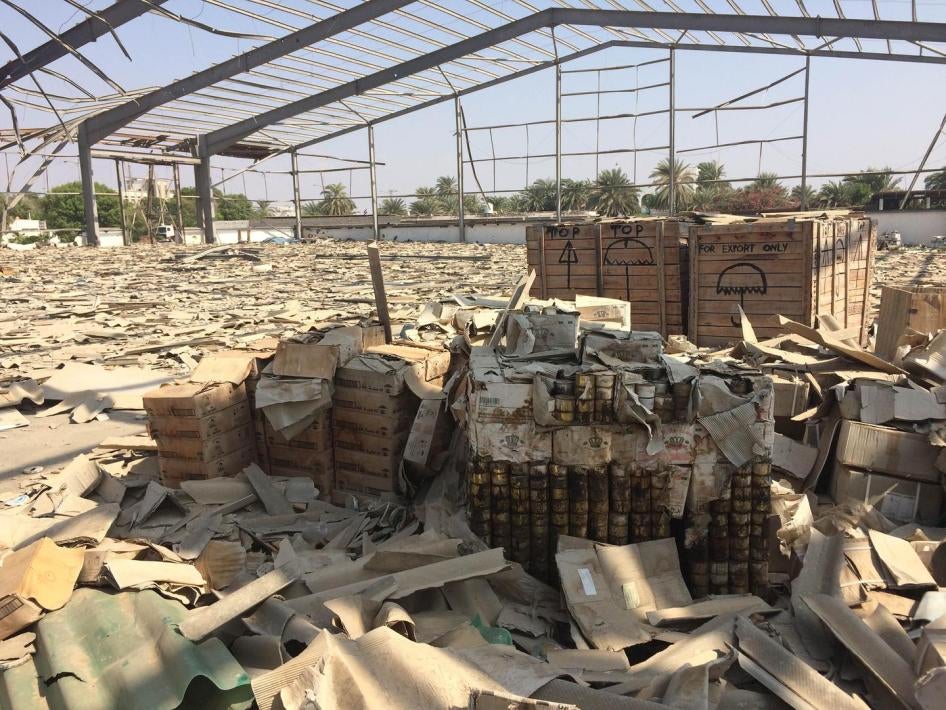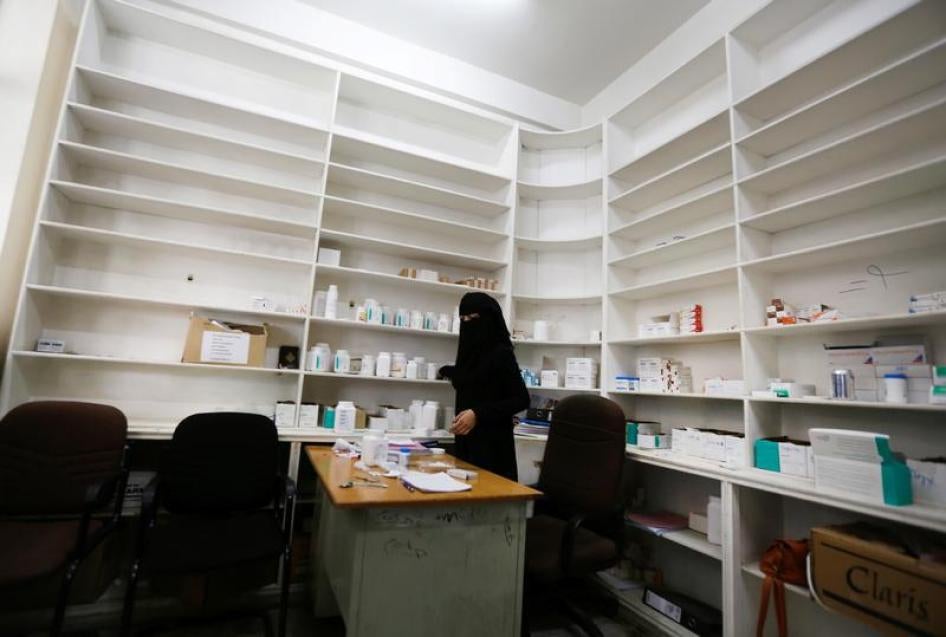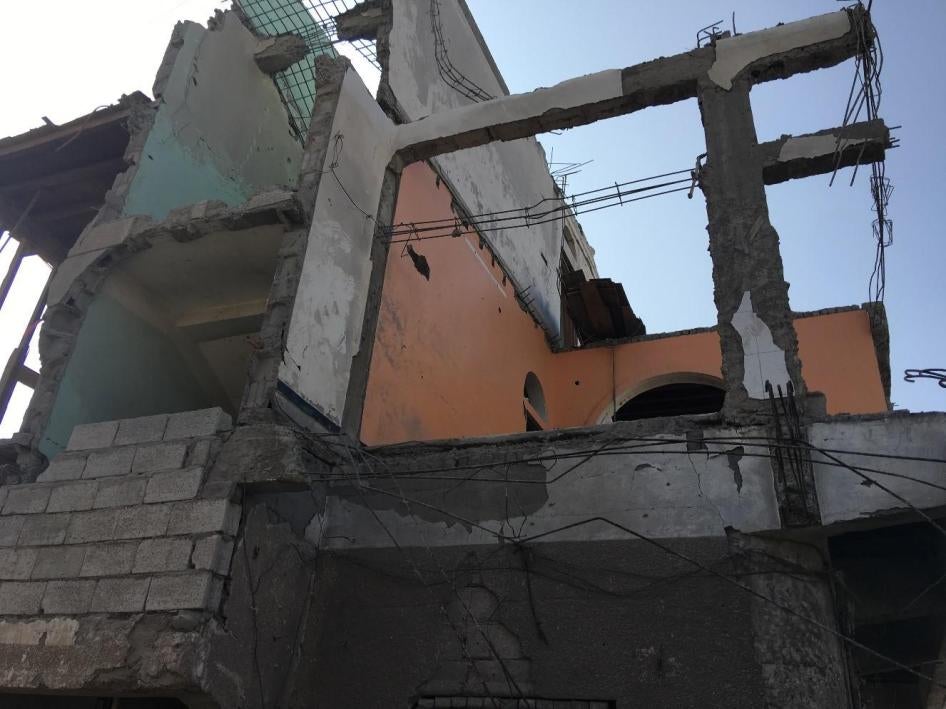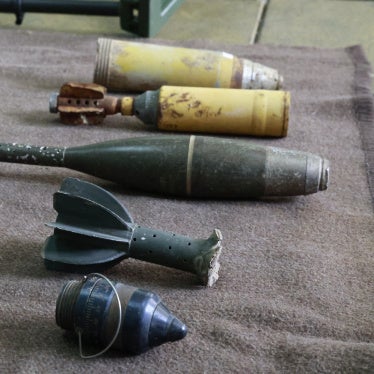(Beirut) – All parties to the conflict in Yemen should minimize civilian harm during military operations against the western port city of Hodeida, Human Rights Watch said today. The Saudi-led coalition, backed by the United States, and Yemeni government-aligned forces, backed by the United Arab Emirates, stepped up attacks on Houthi forces controlling the port in June 2018.
About 70 percent of Yemen’s aid and commercial imports enter through Hodeida and the nearby Saleef port, providing food, fuel, and medicine that the population needs for survival. To comply with international humanitarian law, or the laws of war, warring parties should take immediate steps to provide safe passage and adequate support to civilians fleeing fighting and facilitate the flow of aid and commercial supplies to the broader population and access by humanitarian agencies.
“The coalition and Houthi forces now fighting for Hodeida have atrocious records abiding by the laws of war,” said Sarah Leah Whitson, Middle East director at Human Rights Watch. “The UN Security Council should urgently warn senior officials on both sides to provide civilians access to desperately needed aid.”
Up to 600,000 civilians remain in the vicinity of densely populated Hodeida, which the Houthis took over in late 2014. On June 9, the UAE, which has led coalition operations along Yemen’s western coast, informed humanitarian organizations that they had three days to evacuate the city. The United Nations and other humanitarian organizations withdrew many of their staff, but the UN aid chief, Mark Lowcock said, “It is our plan, intention and hope to stay and deliver.”
The parties to the conflict are bound under the laws of war to take all feasible precautions to minimize civilian casualties and damage to civilian structures. Since the coalition began its military campaign in Yemen in March 2015, coalition forces have committed numerous unlawful airstrikes and used inherently indiscriminate cluster munitions. The Houthis have unlawfully carried out indiscriminate missile strikes, used anti-personnel landmines, and deployed children in combat, as have pro-government Yemeni forces.
The UN has referred to Yemen as the world’s worst and largest humanitarian crisis. As of January 2018, at least eight million Yemenis were on the brink of famine, which is linked directly to the armed conflict. Hodeida’s port is the “single most important point of entry for the food and basic supplies needed to prevent famine and a recurrence of a cholera epidemic,” the UN has said.
UN Security Council Resolutions 2140 and 2216 established a sanctions regime that authorizes the Yemen Sanctions Committee to designate those responsible for serious abuses, including obstructing humanitarian assistance, for travel bans and asset freezes. The Security Council should announce that it will impose these penalties on individuals who commit offenses during the Hodeida offensive that meet the sanctions committee’s designation criteria, Human Rights Watch said.
The US became a party to the Yemen conflict soon after fighting began by providing intelligence and refueling for coalition bombing missions. In 2017, the US sent special forces to assist in locating and destroying Houthi caches of ballistic missiles and launch sites, according to the New York Times. The US has also sold thousands of advanced bombs and rockets to Saudi Arabia, which leads the coalition. The US could become complicit in violations of the laws of war by assisting coalition forces during the Hodeida offensive. The United Kingdom, France and other countries have also sold weapons to coalition forces. US and other foreign officials may be exposed to potential legal liability by selling weapons likely to be used in unlawful attacks.
“The battle for Hodeida could have a devastating impact on civilians both in the city and elsewhere in Yemen,” Whitson said. “Both sides need to seek to minimize civilian harm at all times, whether in carrying out attacks or by allowing families to flee to safety.”
Facilitate Humanitarian Access
Health professionals and humanitarian workers in Yemen have described how parties to the conflict have restricted access to aid and essential goods and the impact on the civilian population. This includes repeatedly failing to abide by laws-of-war requirements to facilitate the delivery of aid to civilians, exacerbating Yemen’s humanitarian crisis.
Further disruption of humanitarian and commercial imports through Hodeida and Saleef will have predictably devastating consequences for civilians, Human Rights Watch said. The inability of essential supplies to reach their final destinations, including to areas under Houthi or Yemeni government control, would also be disastrous.
On June 8, Lise Grande, Yemen’s UN humanitarian coordinator, said: “In a prolonged worst case, we fear that as many as 250,000 people may lose everything – even their lives.… Cutting off imports through Hodeidah for any length of time will put Yemen’s population at extreme, unjustifiable risk.”
The coalition has imposed a naval and air blockade on Yemen since the current conflict began that has severely and disproportionately restricted the flow of food, fuel, and medicine to civilians in violation of international humanitarian law. The coalition closed all of Yemen’s entry points in response to a Houthi missile strike on Saudi’s Riyadh airport on November 4, 2017, keeping Hodeida and Saleef ports closed for several weeks. The closures immediately and predictably exacerbated existing food shortages. The port of Aden in the south, which is controlled by the Yemeni government, does not have the capacity to receive the hundreds of thousands of metric tons of food, fuel, medicine, and other imported goods Yemenis depend on for survival.
Houthi forces have blocked and confiscated food and medical supplies and denied access to civilians in need. They have imposed onerous restrictions on aid workers, interfered with aid delivery, and restricted the movement of ill civilians. The cumulative impact of Houthi obstruction and interference with humanitarian assistance has significantly harmed the civilian population.
Parties to the conflict must facilitate the rapid passage of humanitarian aid for civilians in need and not arbitrarily interfere with it. They must also ensure the freedom of movement of humanitarian workers, which can only be restricted temporarily for reasons of imperative military necessity. Warring parties are also prohibited from carrying out attacks on objects that are indispensable to the civilian population, such as food stores or drinking water installations intended for civilians. The laws of war prohibit using starvation as a method of warfare, and require parties to a conflict not to “provoke [starvation] deliberately” or deliberately cause “the population to suffer hunger, particularly by depriving it of its sources of food or of supplies.”
All parties to the conflict should:
- Take all necessary steps to keep Hodeida and Saleef ports open and operational without interruption to humanitarian and essential commercial goods;
- Take all necessary steps to ensure that aid and essential commercial imports can be taken in at ports and can be transported to civilians throughout Yemen;
- Cease targeting, damaging or destroying objects indispensable to the survival of the civilian population; and
- Ensure the safety and security of humanitarian workers at all times.
Provide Safe Passage to Fleeing Civilians
Thousands of civilians have been displaced as fighting moved up Yemen’s western coast. In Aden in February, families displaced from their homes said they fled because they did not trust the warring parties to distinguish between civilians and combatants in their attacks. They described their fear when “the war came” and that the next mortar attack or airstrike would hit their or their neighbors’ homes. Some said that Houthi or UAE-backed fighters had restricted their flight.
One man, “Talal,” said that after pro-government fighters pushed the Houthis out of Khawka in late 2017, about a dozen Houthi fighters deployed in the woods near his farm. He was worried that coalition forces would attack, but for two weeks the Houthis refused to allow his family to leave. “They said, ‘We will live together or we will die together.’ It was an order,” said Talal. “We heard the sound of airplanes all the time, stuck between the coalition and the Houthis.” His 4-year-old son “would wake up at night, crying, and yell, ‘The airplanes are coming!’” In December, after the Houthis had retreated to the woods, coalition airstrikes hit the family vehicle and their home. Eleven family members, including Talal’s nine children, were at the farm, and his 12-year-old son was severely wounded. They fled on motorbikes to the city of Hays.
Thousands of people displaced from fighting on the western coast have fled to Aden. “Ahmed,” 27, said UAE-backed forces at checkpoints occasionally refused entry to Aden or sought bribes from displaced people. His brother said, “Some of the people who are coming pay at the checkpoint, but it depends where you are from.” People from Houthi areas in the north pay larger bribes, he said. When Ahmed traveled from Taizz to Aden in early 2018, UAE-backed forces held him and a family traveling on the same bus at a checkpoint overnight with nothing to eat – the soldiers took their food and water. The soldiers let Ahmed go in the morning, but the family from the northern city of Saada, whom the soldiers accused of being Houthis, were still being interrogated when he left.
The laws of war require parties to the conflict to take all feasible steps to evacuate civilians from areas of fighting or where fighters are deployed and not to block or impede the evacuation of those wishing to leave. The creation of “humanitarian corridors” and the issuance of effective advance warnings of attack to the civilian population do not relieve attacking forces of their obligation to distinguish at all times between combatants and civilians and to take all feasible precautions to protect civilians.
Deliberately using the presence of civilians to protect military forces from attack is the war crime of “human shielding.”
The parties to the conflict should:
- Remove civilians to the extent feasible from areas in the vicinity of military targets;
- Allow civilians to flee areas of fighting for safety and to obtain aid; and
- Never use civilians as “human shields.”
Avoid Civilian Casualties and Damaging Civilian Structures
Human Rights Watch and others have documented dozens of indiscriminate or disproportionate airstrikes by coalition forces and missile attacks by the Houthis that have caused thousands of civilian casualties. Coalition airstrikes have killed civilians in attacks on markets, homes, schools, hospitals and mosques. In March, the UN human rights office said that coalition airstrikes caused 61 percent of verified civilian casualties in Yemen.
The coalition has repeatedly hit infrastructure critical to the civilian population, including damaging essential port infrastructure in Hodeida. The coalition has carried out airstrikes using explosive weapons with wide-area effect in densely populated areas, including in Hodeida city.
The coalition has repeatedly pledged to minimize civilian harm in its aerial campaign, but has continued to carry out unlawful attacks. In April, the coalition bombed a wedding in Hajjah, killing 22 civilians and wounding at least another 54, about half of whom were children. As in 23 other apparently unlawful coalition airstrikes that Human Rights Watch has documented, the coalition used a US weapon – a Joint Direct Attack Munition (JDAM) satellite guidance kit.
Houthi and government-aligned forces have carried out indiscriminate artillery attacks that have struck populated neighborhoods, killing and wounding civilians. The Houthis have repeatedly fired artillery indiscriminately into Yemeni cities, including after withdrawing from city centers. They have failed to take all feasible precautions against harming civilians by deploying military forces in civilian facilities – including a school and a civilian detention facility.
A so-called dual-use object – one that normally has both civilian and military purposes – is a valid military target so long as the expected concrete and direct military advantage from the attack is greater than the anticipated loss of civilian life and property. Any coalition attacks on Hodeida and Saleef port facilities, which serve a military purpose, will need to take into account the extreme importance of those facilities to the civilian population and the anticipated impact of their destruction, Human Rights Watch said.
All parties to the conflict should:
- Take all feasible measures to ensure the protection of civilians and civilian objects during military operations;
- Act to ensure that attacks on military targets do not cause disproportionate harm to civilians and civilian objects;
- Take all feasible steps, when operating in areas where civilians and combatants are comingled, to minimize the harm to civilians and civilian objects, including by selecting weapons and specific munitions to minimize civilian casualties; and
- Cease use of munitions with wide-area destructive effect in heavily populated areas.
Cease Use of Landmines; Increase Efforts to Clear Explosive Remnants of War
Landmines have killed and maimed civilians, disrupted civilian life, hindered humanitarian access, and prevented civilians’ safe return home in affected areas in Yemen. In any battle for Hodeida, the Houthis, as well as pro-government forces, should not use antipersonnel mines, which pose a threat to civilians long after a conflict ends.
Houthi forces have repeatedly laid antipersonnel, antivehicle, and improvised mines, as they withdrew from areas in Aden, Taizz, Marib and, more recently, along Yemen’s western coast. In February, the Yemen Executive Mine Action Center’s southern branch found antipersonnel mines, antivehicle mines and other types of explosive ordnance, including improvised antipersonnel mines, near the towns of Mokha, Khawka and Hays. One deminer said that, “Areas that have been mined have never been signed [marked with warning signs].” Three years after the Houthis withdrew from Aden, mine survey and clearance operations continue.
Use of antipersonnel landmines violates the laws of war, and those involved are committing war crimes. The indiscriminate use of antivehicle mines and failure to minimize civilian casualties also violate the laws of war. Yemen suffers from a shortage of equipped and trained personnel who can systematically clear landmines and explosive remnants of war.
All parties to the conflict should:
- Cease using antipersonnel mines, destroy any antipersonnel mines in their possession, and appropriately punish those using them;
- Raise awareness among the displaced about the threat of mines, including improvised mines, and develop capacity to rapidly clear homes and residential areas of mines and remnants of war to facilitate the return of the civilian population; and
- Direct international assistance to equip, train, and assist clearance personnel to systematically survey, clear, and destroy Yemen’s mines and explosive remnants of war. International donors should provide assistance for landmine victims, including medical care, prosthetics, and ongoing rehabilitation.
Ensure that No Children Take Part in Fighting
Houthi forces, pro-government forces, and other armed groups have used child soldiers, an estimated one-third of the fighters in Yemen. By August 2017, the UN had documented 1,702 cases of child recruitment since March 2015, 67 percent of which were attributable to formerly aligned Houthi-Saleh forces. About 100 of the verified cases included recruiting children younger than 15, the recruitment or use of whom is a war crime.
The Houthis have recruited, trained, and deployed children in the current conflict. “Yasser,” 20, said that the fear of forced recruitment drove him and two of his close friends to flee Sanaa in 2017. The Houthis had recruited his younger brother, 15 or 16, who then patrolled neighborhoods, worked at checkpoints, and received training. “He takes our father’s weapon when he goes.” The Houthis provided him with food and qat, but no pay. “He goes with seven of his friends around the same age,” Yasser said. Houthi supporters came to their neighborhood almost daily and talked to young men and boys about becoming fighters.
“Salem,” who was displaced by fighting on the western coast, said that children as young as 13 “were ruling us, they have the guns,” while his family remained in Houthi-controlled Mafraq. His family was first displaced to Houthi-controlled Ibb, but they fled to Aden in early 2018 after a local leader warned them the Houthis might forcibly recruit their children.
The local leader, who was also trying to send his children away to protect them, said the Houthis were going around to people’s homes, asking how many men and boys lived there, and registering names for fighting. Their neighbors said families had to provide either money or a person to fight, often a child: “They paid, or they take the kids, so they paid… They would take people who were 16, 17, if they can carry a weapon.” His relative, “Ali,” 16, said that in December 2017 Houthi men on a truck came to his secondary school. “I saw three Houthis with guns trying to take the kids… some of the kids were crying.” He and his friend scaled the school’s wall and ran away. Salem, Ali and about 70 other members of 13 related families were staying together in an abandoned school in Aden when Human Rights Watch interviewed them.
International law sets 18 as the minimum age for participation in direct hostilities, which includes using children as scouts, couriers, and at checkpoints. Under Yemeni law, 18 is the minimum age for military service.
Forces that capture child soldiers should treat them as victims of rights violations, not simply as captured fighters, and abide by international standards. The Paris Principles on Children Associated with Armed Forces or Armed Groups states: “The release, protection and reintegration of children unlawfully recruited or used must be sought at all times, without condition and must not be dependent on any parallel release or demobilization process for adults.”
All parties to the conflict should:
- Ensure that no children take part in fighting in Hodeida;
- Clarify to affiliated forces that recruiting children is unlawful even if they are not serving a military function;
- Appropriately investigate and punish officers who allow children in their units or are responsible for the war crime of recruiting or using children under 15; and
- Provide former child soldiers all appropriate assistance for their physical and psychological recovery and social reintegration.
Investigate Unlawful Attacks
None of the countries that make up the Saudi-led coalition have publicly clarified which alleged unlawful attacks their forces participated in. The investigative body the coalition created in 2016 does not meet international standards and has absolved coalition forces of responsibility in the vast majority of attacks investigated. The coalition has not compensated victims of unlawful strikes or their families, as far as Human Rights Watch has been able to determine.
In response to Human Rights Watch letters in 2016 and 2017, the Houthi-controlled Foreign Affairs Ministry expressed a willingness to investigate reports of landmine use, but not until the conflict ended. Human Rights Watch has not been able to identify any concrete steps the Houthis have taken to investigate potentially unlawful attacks or hold anyone to account for violations.
Countries that are parties to the armed conflict should:
- Impartially and transparently investigate credible reports of alleged violations of the laws of war and make public their findings. Individuals implicated in war crimes should be appropriately prosecuted;
- Conduct investigations using a full range of tools, including interviews with witnesses, surveillance and targeting videos, and forensic analyses. Public findings should include accountability measures taken against individual personnel, redress provided to victims or their families, and an explanation of the process used;
- Provide compensation for wrongful civilian deaths, injuries and harm. The coalition should develop effective systems for civilians to file claims for condolence or ex gratia payments and to evaluate the claims; and
- The US, UK, and France should cease all weapons transfers to Saudi Arabia because of Saudi Arabia’s widespread violations of the laws of war, and weapons transfers to other coalition members that are likely to use them unlawfully.











